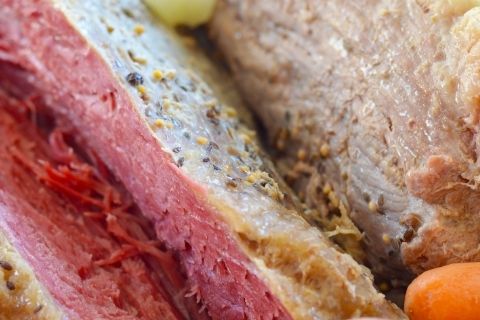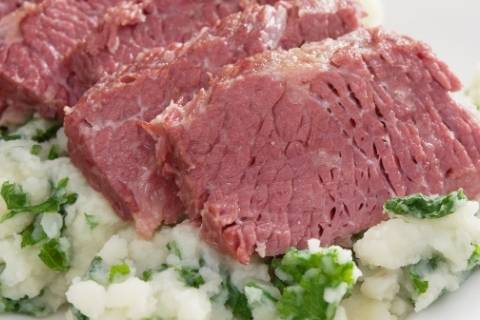How to Tell if Corn Beef Is Overcooked
I was first introduced to corned beef back in 1996 as a young chef in an Irish restaurant in Philadelphia. The head chef, Chef David, was very particular about his methods to preparing his corned beef since it was a staple of the Irish menu we served.
There was a process and a reason for every step of the way to prepare his corned beef and colcannon (traditional Irish corned beef with cabbage and mashed potatoes).
The process was rather simple and turned out perfect every time. So the question posed today is, is cooking corned beef longer better?
Cooking corned beef for too long causes it to become tough not tender as will cooking it too hot. Corned beef comes from the lower chest of the cow known as the brisket, which holds up the 1200-1600 pound animal. So the meat is comprised of dense, tough muscle, and mostly connective tissue already.
While brisket does require longer cooking to break down those connective tissues, the fact that it is corned beef also makes a difference.
Brisket becomes corned beef through a process of curing with salt, known as corns, and a brine solution.
This curing process will toughen the meat but preserve it and give it the pinkish coloring.
Now that we know where the meat comes from and how is becomes corned beef we can identify the best cooking process.
How To Cook Corned Beef
Cooking corned beef is relatively simple and you will get different opinions of the best method from different experts.
While all these methods could be accurate, you will find that most will tell you that choosing a moist method of cooking is the best.
Simmering the corned beef is the most simplistic and the most common.
Take note that I said "simmering" and not boiling.
There are only 3 simple steps to perfectly cook corned beef, rinse, cook, then rest. After that you can slice and enjoy.
3 Easy Steps For Cooking Perfect Corned beef

1. Rinse
I always find it important to rinse the corned beef to remove excess salt. A good way to do this is to rinse it in cold water and drain.
Do this 2-3 times to remove the salt. At the Irish place I worked we had a different method for this that was a tad more complicated, so I will not go into this method.
Some people may soak the meat in cold water in the fridge overnight which also works. Whichever way you choose the result is the same, removing excess salt.
2. Cook
To cook corned beef simply place in pot big enough to hold the meat and cover completely with liquid.
It is critical to cover the beef so it is fully submerged and add the spice packet or add your own spice blend.
Cover and bring temperature up to a gentle simmer. Do not boil, this will make the meat tough and chewy.
You are looking for a low simmer and the rule of thumb for corned beef is 50-60 minutes per pound of meat.
Gently simmer, do not boil, and 50-60 minutes per pound. As for the cooking liquid you can use water or if you would like, beer works too.
Keep an eye on the level of liquid throughout the cooking process and if it drops then add some water.
1. Rest
Corned beef like other meats benefits from a resting period after cooking. Not because of anything unique with the corned beef, but it does benefit in the same way.
Resting allows the juices and liquid within the meat to relax instead of rising or evaporating. This allows the moisture within to be even throughout the corned beef.
Also resting allows for a final cooking, as meat tends to continue to even after removing it from a oven or grill.

How To Tell When Corned Beef Is Done
There are two parts to being done. First, the meat should have an internal temperature of 145 degrees. Second, it needs to be fork tender. The best way to check the tenderness is to take a fork and pull at it, the meat fibers should easily pull apart.
If after the proper time per pound of meat, the meat does not pull apart then let it go and check every 20 minutes until it is fork tender.
Do not turn the heat up during any part of this process. When the corned beef is completed then remove and let it rest 3-5 minutes.
You can reserve your cooking liquid and cook cabbage, onions, and potatoes with it while your beef is resting.
So maybe you forgot you had it on the stove and it went too long, now it is tough because it is overcooked. Is there anything that can be done to save the corned beef?
Can You Fix Tough Corned Beef?
Yes, there is a method that can work although the best method is to set a timer to ensure you do not overcook. But if you do, then you can preheat an oven to 350 degrees, place overcooked corned beef in a pan with a little bit of liquid, then cover completely with foil or a lid.
Place pan in oven and cook for about 30 minutes. The key here is to get the meat to cook at 250 degrees for 30 minutes, this should result in a tender beef.
Properly prepared corned beef can be enjoyed hot or cold. It is recommended that it be sliced thin but if done correctly it really shouldn't matter all that much, this would be a matter of preference.
Enjoy your corned beef colcannon or have it as a deli style cold corned beef special.
By Chef Michael Hall
Source: https://cookingchops.com/corned-beef-more-tender-the-longer-it-is-cooked/
0 Response to "How to Tell if Corn Beef Is Overcooked"
Post a Comment